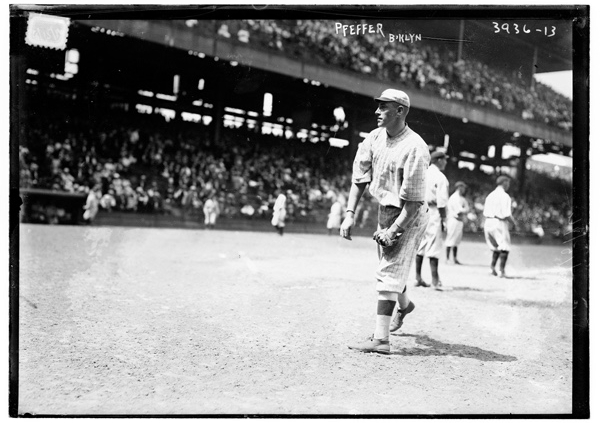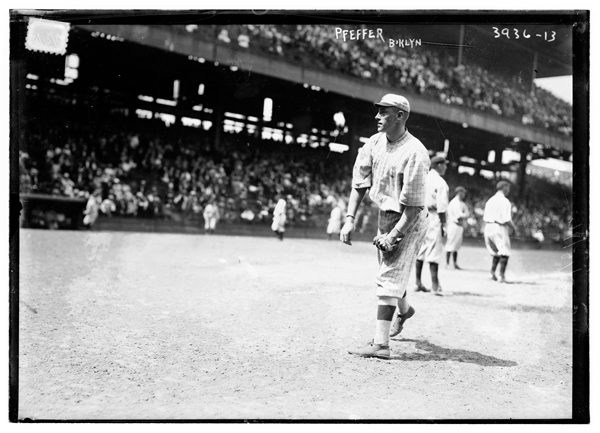June 1, 1919: Brooklyn’s Jeff Pfeffer tosses 18-inning complete game
Jeff Pfeffer was a rugged right-hander who anchored Uncle Robby’s pitching staff at the end of the Deadball Era. In parts of nine seasons (1913-1921) with Brooklyn, he went 113-80, including 25 wins in 1916 and 23 in 1914. (Photo: Library of Congress)
Brooklyn’s Jeff Pfeffer (not to be confused with his brother, Big Jeff Pfeffer1) was the National League’s hottest pitcher to start the 1919 season. He won each of his first seven starts, pitching a complete game in each (one of them going 11 innings), with an ERA of 1.38. His winning streak came to an end on May 28, when he pitched another complete game – this time going 13 innings – but was defeated by the Cardinals, 7-5.
Four days later he went the distance again. This time the distance was quite a bit farther.
Pfeffer faced the Philadelphia Phillies at Ebbets Field on June 1, 1919.2 His mound opponent was former Columbia University star George Smith, who had been Pfeffer’s Brooklyn teammate the year before. Smith was traded to the Giants after the 1918 season and then dealt to the Phillies two weeks before this game.
Both pitchers got off to rocky starts. The Phillies used consecutive singles by Cy Williams, Irish Meusel, Fred Luderus, and Gavvy Cravath in the top of the first to score two runs, then the Robins tied the game in the bottom of the inning. After Ivy Olson and Tommy Griffith singled, Zack Wheat drove Olson in with a single to right, and when right fielder Cravath let the hit go through him, Griffith came around to score.
Brooklyn took a 3-2 lead in the fourth inning when Wheat doubled, moved to third on a sacrifice by Hy Myers, and scored on Ed Konetchy‘s single. Pfeffer held onto the lead until the sixth, when the Phils tied it on a two-out walk to Luderus followed by singles by Cravath and Doug Baird.
Williams put the Phillies on top in the seventh inning with a two-out, two-run homer over the right-field wall, scoring Bert Adams, who had singled.3 The Phils made it 7-3 in the eighth inning. Baird reached on a two-out infield single and went to third on a single by Harry Pearce. With Adams at the plate, the Phillies attempted a double steal. Catcher Ernie Krueger‘s throw went through to shortstop Olson, who then threw back to home to try to retire Baird. Olson’s throw was high, Baird scored, and when the ball went into the grandstand, umpire William “Lord” Byron allowed Pearce to score as well.4
But Smith couldn’t hold onto the lead, and the Robins batted around in the bottom of the eighth to tie the game. Olson led off with a single to right and went to second when Cravath fumbled it for his second error of the game. Lee Magee beat out an infield hit, Olson going to third, and Griffith walked to load the bases.5 Wheat followed with a single off second baseman Possum Whitted‘s shoe to score Olson, and Myers brought Magee and Griffith home with a single. Konetchy advanced the runners to second and third with a sacrifice, then Clarence Mitchell, making his first appearance of the season pinch-hitting for third baseman Lew Malone, walked to load the bases. Wheat scored the tying run when Krueger hit a groundball to short, Mitchell being forced out at second. With the go-ahead run on third, Brooklyn manager Wilbert Robinson allowed Pfeffer to bat for himself, and he struck out to end the inning.6
Both teams were scoreless in the ninth and 10th innings, with Milt Watson coming in to pitch for the Phillies in the ninth after Smith was removed for a pinch-hitter in the top of the inning. Then Philadelphia scored in the 11th, with the help of two Brooklyn errors. Adams doubled, went to third when Wheat muffed Watson’s fly ball to left, and scored when second baseman Magee fumbled Meusel’s grounder. Watson also tried to score on the play, but right fielder Griffith scooped up the loose ball and made a perfect throw to the plate to retire him.7 The Robins kept the game going when Magee tripled in the bottom of the inning and Griffith brought him home with a sacrifice fly.
The game was scoreless through the next four innings, but the Robins missed an opportunity to win the game in the 14th. Griffith led off with a walk and went to third on Wheat’s single to right.8 Myers hit a groundball that went off the hand of third baseman Baird; shortstop Pearce picked it up and threw to first to retire Myers, with Griffith holding at third. “Tommy could easily have scored the winning run then and there,” in the view of the Brooklyn Daily Eagle.9 Konetchy was intentionally walked to load the bases. Ray Schmandt then hit a tapper that catcher Adams grabbed with his foot on home plate to force out Griffith, then threw to first to retire Schmandt, who had made no attempt to run, thinking it was a foul ball. The Robins protested, but to no avail, and the inning was over.10
In the top of the 16th, with Pfeffer still on the mound, Whitted singled, advanced to second on Williams’s sacrifice, and scored on Luderus’s two-out base hit. Brooklyn wasn’t done yet, though. In the bottom of the inning, Griffith and Wheat singled. Myers bunted, and Watson’s throw to third was too late to retire Griffith, leaving the bases loaded with none out. Konetchy hit a groundball back to the box; Watson threw home to retire Griffith, but Adams’s throw to first attempting to retire Konetchy was off target and Wheat scored the tying run on the error.11 The Robins still had the winning run in scoring position, but Schmandt was retired on a short fly ball to left and Pfeffer popped out to third. (Pfeffer didn’t hit a ball out of the infield in eight trips to the plate in the game.12)
In the top of the 18th, Williams – batting for the ninth time – singled to right with one out, went to second on Meusel’s groundout to Pfeffer, and scored when Luderus doubled to right-center, his fourth hit of the day. The Robins had already come from behind to tie the game four times, but this time they had no answer; Watson retired the side in order in the bottom of the inning, striking out Myers and Konetchy for the final outs – the only batters Watson fanned in his 10 innings of work – and the Phillies came away with a 10-9 victory.
Pfeffer faced 77 batters in his 18 innings of work, allowing 23 hits. It wasn’t his longest outing in the major leagues; on June 17, 1915, he pitched 18⅔ innings at Chicago before the Cubs won in the bottom of the 19th.13
This wasn’t the longest game the Robins and Phillies played against each other in 1919. On April 30 in Philadelphia, the teams played a 9-9 tie that was called on account of darkness after 20 innings. Both starting pitchers went all the way in that game, Burleigh Grimes for the Robins and Joe Oeschger for the Phils, facing 84 and 82 batters, respectively.14 Two weeks later, the Phillies traded Oeschger to get George Smith.
SOURCES
In addition to the sources cited in the Notes, the author accessed Retrosheet.org, Baseball-Reference.com, SABR.org, and The Sporting News archive via Paper of Record.
NOTES
1 Jeff Pfeffer’s given name was Edward; Big Jeff’s given name was Francis. One researcher says both got their nicknames from their supposed physical resemblance to heavyweight boxing champion Jim Jeffries. John Bennett, “Jeff Pfeffer,” Society for American Baseball Research Baseball Biography Project. https://SABR.org/bioproj/person/25b464c2. But another researcher found no evidence that the nickname was connected to Jeffries. Bill Lamb, “Big Jeff Pfeffer,” Society for American Baseball Research Baseball Biography Project. https://SABR.org/bioproj/person/fa863125. Lamb found that Francis Pfeffer was usually referred to in newspapers as “Frank” – the name he called himself – and was seldom referred to as “Big Jeff.” Different newspaper accounts of the June 1, 1919, game refer to Edward Pfeffer as Ed, Jeff, and Big Jeff.
2 This game would be a rare one-game series, making up a game that was rained out on May 7. Brooklyn had a rare Sunday offday originally scheduled for June 1. Their next series was to be against Boston, where Sunday games weren’t allowed until 1929.
3 Home runs were still relatively rare in 1919; only 22 were hit in 70 games at Ebbets Field. Williams finished the year with nine homers, third-most in the National League.
4 “Robins Wage Futile Fight Against Philadelphia Through Eighteen Innings,” New York Times, June 2, 1919: 18.
5 Mitchell was normally a pitcher – he won 125 games in the major leagues – but he was frequently used as a pinch-hitter and had a .252 career batting average. He also started 61 games at first base and 12 in the outfield in his major-league career.
6 In fairness, Pfeffer was a decent hitter for a pitcher, finishing his major-league career with a .206 batting average. He even started a game in right field and batted seventh when the Robins had a number of injured players in 1917. Even though Pfeffer had already given up seven runs, Robinson was in no hurry to take him out of the game, as the Robins had six games scheduled in Boston over the next three days and their pitching staff would be stretched thin. Brooklyn played consecutive doubleheaders at Boston on June 2, 3, and 4 to make up three games that were postponed by weather on April 24, 25, and 26. George B. Underwood, “Luderus’ Double Downs Dodgers in 18th Inning,” New York Sun, June 2, 1919: 17. The Sun and Philadelphia Inquirer referred to Brooklyn’s team as the Dodgers; the Brooklyn Daily Eagle called them the Superbas. Other sources called them the Robins, the nickname commonly used during Wilbert Robinson’s managerial tenure.
7 “Robins Not Getting the Utmost from Their Consecutive Hitting,” Brooklyn Daily Times, June 2, 1919: 8.
8 Al C. Palma, “Playing Long Games Becoming a Habit with the Robins,” Brooklyn Citizen, June 2, 1919: 5.
9 “Hitting ‘Em Out,” Brooklyn Daily Eagle, June 2, 1919: 2.
10 “Phillies Down Dodgers in Grand 18-Inning Battle, Score 10 to 9,” Philadelphia Inquirer, June 2, 1919: 14.
11 “A Long, Sad Story, Mates; Just 18 Innings of It,” Brooklyn Daily Eagle, June 2, 1919: 18.
12 Al C. Palma, “Playing Long Games Becoming a Habit with the Robins.”
13 That was the game in which the Cubs’ George Washington “Zip” Zabel set the major-league record that still stands, pitching 18⅓ innings in relief after starting pitcher Bert Humphries was injured in the first inning.
14 Oeschger is best remembered for another game he pitched against Brooklyn, when he was with the Boston Braves, going all the way in a 26-inning 1-1 tie on May 1, 1920. He faced 90 batters in that game, six fewer that Brooklyn’s Leon Cadore, who also went the distance.
Additional Stats
Philadelphia Phillies 10
Brooklyn Robins 9
18 innings
Ebbets Field
Brooklyn, NY
Box Score + PBP:
Corrections? Additions?
If you can help us improve this game story, contact us.



